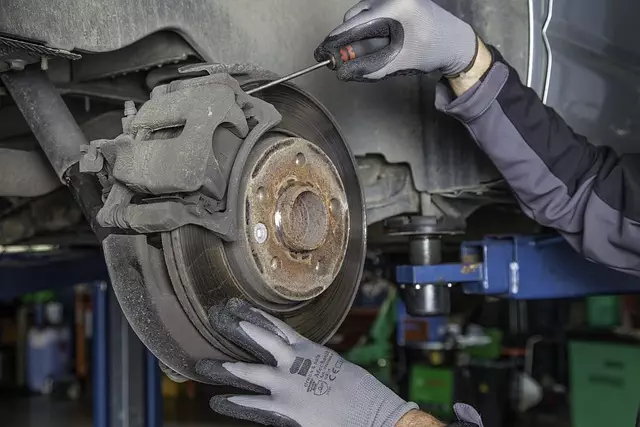TL;DR:
Foundation inspection is crucial for homeowners aiming to preserve their property's structural integrity. Regular checks detect early signs of settlement, heave, or shifting, preventing minor issues from turning into costly major repairs. Key elements to scrutinize include cracks, uneven surfaces, water damage, misaligned doors/windows, and inadequate drainage. Common problems like cracks and uneven floors signal structural instability caused by various factors. Early intervention through regular inspections allows for cost-effective repairs. Moisture management is vital; excessive humidity leads to structural damage, mold growth, and material corrosion.
Schedule a thorough foundation inspection every 3-5 years or upon noticing signs of damage. Advanced technology like drones, ground-penetrating radar, and AI-driven software enhance precision and efficiency in foundation assessments. Maintaining clear drainage paths, addressing immediate signs of damage, and proper soil compaction are essential for long-term foundation health. Regular maintenance and monitoring moisture levels prevent water-related damage, strengthening structural integrity and reducing the need for frequent inspections.
“Ensure the structural integrity of your home with a comprehensive understanding of foundation inspection. This essential practice, known as preventative foundation inspection, is crucial for homeowners seeking to mitigate potential risks. By identifying issues early, from cracks and instability to moisture intrusion, you can prevent costly repairs.
Learn what to look for, common problems, and advanced technology employed in these inspections. Discover cost-effective measures to fortify your home’s foundation, ensuring its longevity and stability.”
Understanding Foundation Inspection: Why It's Essential for Homeowners

Foundation inspection is a critical process that every homeowner should prioritize for maintaining their property’s structural integrity. It involves a thorough evaluation of a home’s foundation, looking for signs of damage, cracks, unevenness, or any other anomalies. These inspections are not just about identifying cosmetic issues; they are essential for ensuring the safety and longevity of your house. By proactively assessing the foundation, homeowners can prevent costly repairs and potential hazards in the future.
Regular foundation inspections offer several benefits. They help detect early signs of problems like settlement, heave, or shifting, which could be indicative of more severe structural issues. With prompt attention, minor issues can often be addressed before they turn into major, expensive repairs. Moreover, it gives homeowners peace of mind, allowing them to make informed decisions about their property’s care and maintenance, thus safeguarding their investment.
What to Look For During a Preventative Foundation Inspection

During a preventative foundation inspection, several key elements should be scrutinized. Look for signs of cracks or uneven surfaces in the foundation walls. These could indicate structural damage or settling issues that require attention. Inspect the foundation for any water damage or moisture buildup, as these problems can lead to mold growth and further compromise the structure’s integrity.
Pay close attention to the doors and windows, checking for misalignment or gaps that might suggest movement in the foundation. Also, verify that the drainage around the property is adequate and free from blockages, as proper water flow is crucial for preventing erosion and water damage to the foundation. Lastly, assess the overall stability of the structure by checking for signs of slant or settlement, which could point to more serious foundation issues.
Common Issues Found in Foundations and How to Address Them

Foundations, often considered the backbone of a structure, can harbour various issues that might go unnoticed until it’s too late. During a preventative foundation inspection, professionals look out for signs of damage and instability. Common problems include cracks in the foundation walls, uneven floors, visible gaps around doors or windows, and water damage. These issues could indicate structural instability caused by poor soil conditions, improper construction, or settling.
Addressing these problems early is crucial. Minor cracks can be repaired with epoxy injections, while more extensive damage might require full-scale rehabilitation. Leveling uneven floors or sealing gaps can prevent water infiltration, which over time can lead to severe foundation deterioration. Regular inspection and timely maintenance are key to preserving the integrity of a building’s foundation, ensuring longevity, and saving on costly repairs in the future.
The Role of Moisture in Foundation Health and Prevention Strategies

Moisture plays a pivotal role in the health and longevity of foundations, making it an essential aspect to consider during preventative foundation inspections. Excessive moisture can lead to various issues such as structural damage, mold growth, and corrosion of materials used in construction. Regular inspection should include assessing any signs of water intrusion or leaking, which could indicate problems with waterproofing membranes or cracks in the foundation walls.
Preventative strategies focus on maintaining optimal moisture levels. This involves implementing measures like proper drainage systems to divert surface water away from the foundation, ensuring adequate ventilation within the structure, and addressing any known issues with humidity control. Regularly inspecting and sealing gaps or cracks can prevent moisture penetration, thus safeguarding the foundation against potential long-term damage.
When to Schedule a Foundation Inspection: Key Indicators of Potential Problems

Knowing when to schedule a foundation inspection is crucial for maintaining the structural integrity of your home. While regular visual inspections can reveal some issues, a comprehensive foundation inspection is recommended every 3-5 years or whenever you notice key indicators of potential problems. These signs include noticeable cracks in the foundation walls, uneven floors, stuck doors or windows, and visible slant or settlement in the structure.
Moisture intrusion, inadequate drainage, soil erosion, and shifting ground conditions are common causes of foundation issues. If you experience persistent water seepage, dampness in basements or crawl spaces, or notice changes in the alignment of your home’s structural elements, it’s essential to consult a professional inspector. They will use advanced techniques such as moisture meters, ground radar, and non-invasive testing to assess the overall health of your foundation and provide recommendations for any necessary repairs.
Advanced Technology in Foundation Inspection: Tools for Comprehensive Analysis

In today’s digital era, advanced technology has revolutionized the field of foundation inspection, enabling more comprehensive and precise analysis than ever before. Tools like drones equipped with high-resolution cameras and thermal imaging sensors can access hard-to-reach areas, providing detailed visual data for structural assessment. Additionally, ground-penetrating radar (GPR) offers non-invasive imaging, detecting anomalies beneath the surface without disturbing the foundation. These innovative solutions significantly enhance the efficiency and accuracy of foundation inspections, ensuring early detection of potential issues.
Moreover, software applications have been developed to interpret and analyze the vast amounts of data collected during these inspections. AI-powered systems can identify patterns indicative of structural weaknesses or damage, alerting professionals to areas that require further investigation. This technology not only saves time but also improves safety by minimizing the need for extensive physical examinations in hazardous conditions. With such sophisticated tools at their disposal, inspection teams can conduct thorough foundation assessments, ultimately contributing to the longevity and integrity of structures.
Cost-Effective Preventative Measures to Strengthen Your Home's Foundation

Regular foundation inspections are a cost-effective way to maintain and strengthen your home’s structural integrity. By identifying potential issues early, you can prevent costly repairs down the line. One of the simplest preventative measures is to keep an eye on any signs of cracks or uneven floors, which could indicate foundation problems. Regularly checking for these signs, especially in older homes, can help catch issues before they become severe.
Additionally, ensuring proper drainage around your home is crucial. Blocked gutters and inadequate landscaping can lead to water damage, which over time weakens the foundation. Maintaining clear drainage paths and sloping the ground away from the house helps prevent water from pooling near the foundation, thus reducing the risk of structural damage.
Maintaining Your Foundation: Long-Term Strategies for Optimal Health

Maintaining your foundation’s health is a long-term strategy that goes beyond routine inspections. Regular maintenance involves addressing any signs of damage, cracks, or shifting as soon as they appear. This proactive approach ensures that minor issues don’t escalate into costly repairs. Implementing simple measures like repairing water leaks, clearing drainage systems, and ensuring proper soil compaction around the foundation can significantly contribute to its longevity.
Additionally, regular monitoring of moisture levels in the soil and the use of appropriate waterproofing materials can prevent water-related damage, a common cause of foundation failures. Staying vigilant and implementing these strategies will not only enhance the structural integrity of your foundation but also provide peace of mind, knowing your home is built on a solid base, reducing the need for frequent foundation inspections.



